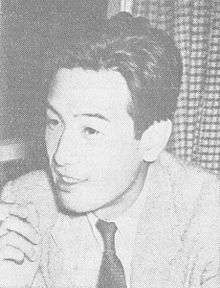Yasushi Akutagawa

Yasushi Akutagawa (芥川 也寸志 Akutagawa Yasushi, July 12, 1925 — January 31, 1989)[1] was a Japanese composer and conductor. He was born and raised in Tabata, Tokyo. His father was Ryūnosuke Akutagawa.
Akutagawa studied composition with Kunihiko Hashimoto and Akira Ifukube at the Tokyo Conservatory of Music. He was one of the members of Sannin no kai (The Three) along with Ikuma Dan and Toshiro Mayuzumi.
In 1954, when Japan did not have diplomatic relations with the Soviet Union yet, he entered the Soviet Union illegally, and made friends with Dmitri Shostakovich, Aram Khachaturian and Dmitri Kabalevsky. Akutagawa was the only Japanese composer whose works were officially published in the Soviet Union at that time. His 1950 Music for Symphony Orchestra reflects his love of the music of Shostakovich and his debt to the Russian's great film scores.
His compositions were influenced by Stravinsky, Shostakovich, Prokofiev and Akira Ifukube.
He was popular as a master of ceremonies of TV shows as well. As an educator, he devoted himself to train an amateur orchestra, Shin Kokyo Gakudan ("The New Symphony Orchestra"). Almost one year after Akutagawa died, in 1990, the Akutagawa composition award was established in his memory.
Akutagawa and The New Symphony Orchestra are the recipient of the 1976 Suntory Music Award.
Selected list of works
Opera
- L'Orphee de Hiroshima (Orpheus in Hiroshima), text by Kenzaburō Ōe (1960/67)
Orchestral works
- Prelude for Symphony Orchestra (1947)
- Trinita sinfonica (1948)
- Musica per orchestra sinfonica (Music for Symphony Orchestra) (1950)
- Music for microphone (1952)
- Triptyque for string orchestra (1953)
- Prima sinfonia (Symphony No.1) (1954/55)
- Divertimento (1955)
- Symphony for Children "Twin Stars" for children's choir and orchestra, text by Kenji Miyazawa (1957)
- Ellora Symphony (1958)
- Negative Picture for string orchestra (1966)
- Ostinata sinfonica (1967)
- Concerto ostinato for violoncello and orchestra (1969)
- Rapsodia per orchestra (1971)
- Concerto ostinato for GX1 and orchestra (1974)
- Lullaby of Akita for violin and orchestra (1977)
- Allegro ostinato (1986)
- Sounds for organ and orchestra (1986)
- Ballade on a Theme of Godzilla (1988) - Dedicated to Akira Ifukube
Ballet
- Paradise Lost (1950)
- A Dream Under The Lake (湖底の夢) (1950)
- Kappa (1951)
- Flame...star (炎も星も) (1953)
- The Spider Web (1968)
- The Moon (1981)
Ensemble/instrumental works
- Piano trio (1946)
- String Quartet (1948)
- La danse for piano (1948)
- Ballade for violin and piano (1951)
- Nyambe (1959)
- Music for strings No. 1 (1962)
- 24 Preludes for children for piano (1979)
Film scores
- The Skin of the South (南国の肌 Nangoku no hada) (1952)
- Gate of Hell (1953)
- Takekurabe (たけくらべ Takekurabe), English titles include: Adolescence aka Growing Up Twice aka Growing Up aka Child's Play (1955)
- The Hole (穴 Ana) aka Hole in One aka The Pit (1957)
- Fires on the Plain (1959)
- Portrait of Hell (1969)
- Mt. Hakkoda (film) (1977)
- Village of Eight Gravestones (1977)
- The Demon (1978)
Television scores
- Forty-seven Ronin (1964) - Opening Theme
- Ai no Gakko Cuore Monogatari (1981) - Opening Theme, Ending Theme
- Benkei (1986) - Opening Theme